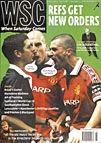 Dear WSC
Dear WSC
Just a pedantic correction to Matthew Taylor’s piece in WSC 156 about foreigners in Britain throughout the century. Danish international Nils Middleboe did indeed play for Chelsea from 1913, but not just for one season. He made 46 appearances for the club between 1913 and 1921, a period encompassing five seasons. As an amateur, he reputedly never even claimed his expenses, rather like today’s foreign contingent. Incidentally, and though I’ve got nothing in particular against Germans or Germany myself, I was interested in Uli Hesse-Lichtenberger’s suggestion in the same issue that the Belgians have never forgotten the German invasion of 1914. The similar over-running of their country in 1940 probably didn’t help either and may be fresher in some elderly Belgians’ memories.
Peter Collins, London SW17
Search: ' Euro 68'
Stories
 Ian Plenderleith discovers a global online community of football fans
Ian Plenderleith discovers a global online community of football fans
If you’ve got a Norwegian footballer at your club (and let’s face it, who hasn’t?), you may need to check what they are saying on the Sportsprofiler site, which houses home pages for nearly 40 of the country’s top players.
 Time for a chat with Mark E Smith of The Fall, whose football experiences include encounters with a goalkeeping plumber and a controversial match against the Icicle Works
Time for a chat with Mark E Smith of The Fall, whose football experiences include encounters with a goalkeeping plumber and a controversial match against the Icicle Works
You grew up in Salford, which is more United than City. Is there a reason why you’re a City fan?
Not really, just to be contrary I suppose. Also you want to support the opposite team to your dad and my dad had been a United fan. Back in the 1950s he’d to go to away games on his bike – he’d cycle to places like Leicester. But I converted him to City. I had another United connection, though. I applied for a clerical job at the Edwards family’s meat factory after I left school. It was £9 a week. It might even have been Martin Edwards who did the interview. He said “Well the meat wagons come in, just sit there, fill in these forms and file them.” I said, “When would the job start?” and he said “You’ve started” and he left me in the office.
 The new TV deal may be more or less recognisable. It's the one after that will spark revolution, says Patrick Harverson
The new TV deal may be more or less recognisable. It's the one after that will spark revolution, says Patrick Harverson
If you think the Premier League’s new television deal will be different when it is unveiled sometime this year, wait until the next one. The shape of the soon-to-be-negotiated contract will represent a big step forward from the present one, but the contract after that will reflect something altogether more interesting – a revolution, not just in the way football games are sold by clubs and acquired by media companies, but also in the way they are paid for and watched by fans.
 With the next Premier League deal in the offing, ITV’s Jim Rosenthal discusses changes in broadcasting since the arrival of Sky and casts doubt on Duncan Ferguson’s mystique
With the next Premier League deal in the offing, ITV’s Jim Rosenthal discusses changes in broadcasting since the arrival of Sky and casts doubt on Duncan Ferguson’s mystique
What has been the main impact of Sky since 1992 from the broadcasters’ point of view?
They’ve taken football coverage on to a new level and basically, for us, they have created a lot of work within the industry. Football saved Sky, but in return people in TV recognise what Sky have done for football. They have obviously created a vast amount of wealth for the game – wealth that football has spent as it always will, not necessarily wisely. If you give football club chairmen £1, they will always spend £1.10.